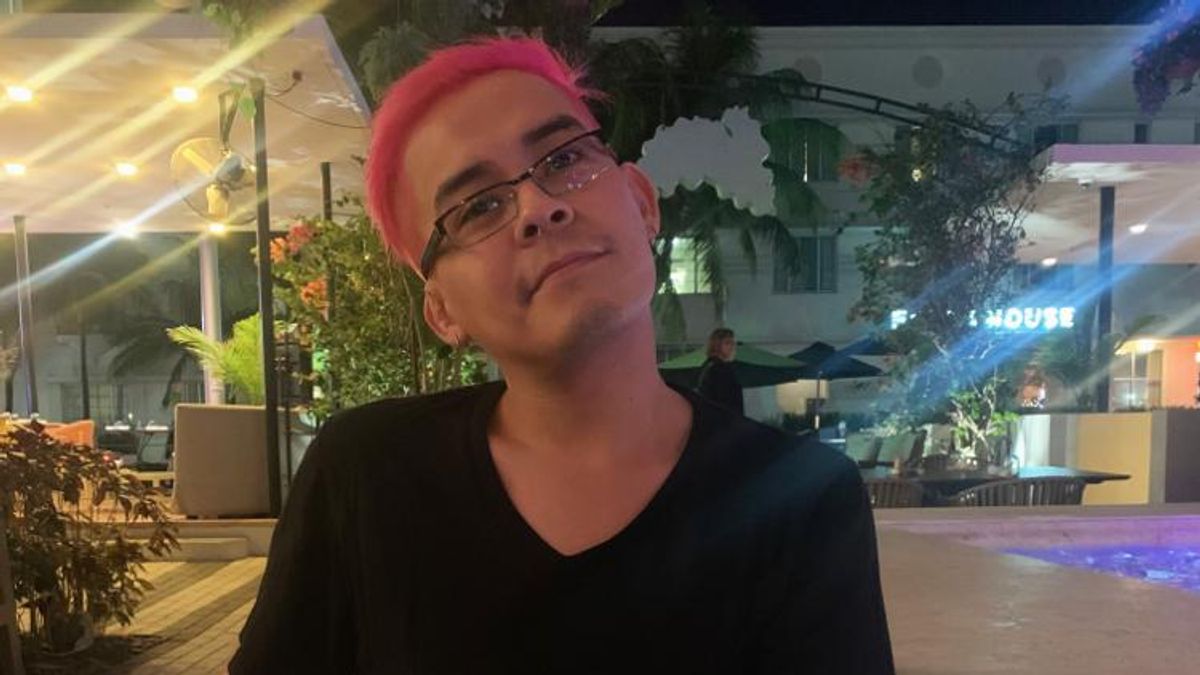Youth
Talking Resilience and Identity With a Young Latinx HIV Role Model

Karlo Manzo-Arroyo, a certified HIV counselor and tester in Chicago, connects with us for National Youth HIV & AIDS Awareness Day.
April 10 2020 3:23 AM EST
By continuing to use our site, you agree to our Privacy Policy and Terms of Use.

Karlo Manzo-Arroyo, a certified HIV counselor and tester in Chicago, connects with us for National Youth HIV & AIDS Awareness Day.
Karlo Manzo-Arroyo is not overwhelmed by the pandemic; he may be too busy to be. When the 26-year-old isn't working as a certified rapid HIV tester and counselor at Illinois's Department of Public Health, he's Zooming through classes at the University of Illinois-Chicago. Manzo-Arroyo's education is partly funded by a coveted scholarship he received from the The National AIDS Memorial, specifically through the organization's Pedro Zamora Young Leaders Scholarship.
Balancing school, work, a partner, and a pet isn't easy, but Manzo-Arroyo takes it all in stride. We spoke with this impressive leader for National Youth HIV & Awareness Day and got his clear-eyed takes on HIV stigma, racial privilege, and how to face COVID-19 with strength, not panic.
Plus: Thanks for connecting with us during this hectic time. First, tell us how you got involved in HIV activism.
Manzo-Arroyo: To be honest, I never saw myself working in HIV activism directly. Being Latinx, a DACA recipient, and gay, growing up I was already worried about those three identities and how they would impact me. As I became more open about each identity, individually and combined, I started being more vocal about marginalized communities. Eventually, my partner started working at a nonprofit that serves homeless, trans, LGBTQ+, HIV-positive, and other marginalized individuals. When they had an opening for a Rapid HIV Tester, my partner told me about it, I decided to apply, and the rest is history.
What do you think are currently the biggest concerns for HIV-positive young people, especially POC?
I personally believe the biggest concerns are stigma and the lack of resources to individuals that hold intersectional identities. For instance, right now I know of resources available to undocumented POC because of the work I have been doing for the past few years. However, if I were still the same gay, undocumented, brown kid growing up in the Logan Square area of Chicago, I would have no idea of what resources were available to me. And I can still say, WILL say, that the stigma in POC, monolingual, LGBTQ+, undocumented communities is still alive; still making it difficult for individuals to look for resources and find the help they need.
How does your Latinx identity influence your work?
I take it everywhere I go. Being Mexican, a DACA recipient, and having English as my second language, I know first hand what some Latinx communities go through. I make sure that wherever I am, I am using my knowledge and experience to help those that need it. For example, this connection with my identities motivates me to translate for individuals that do not know English and to advocate within organizations for the implementation of Spanish documents for Latinx communities that they could, and should, be serving.
How is COVID-19 affecting your work and concerns?
Well, right now I am working from home full-time and my college courses have been completely moved to online. So it has definitely shifted my daily routine. As for concerns, it has been a stressful couple of weeks. I am privileged enough to be able to work from home and still continue my education. However, I cannot imagine what other people are going through. Selfishly, I will not be able to meet my first nephew, born on the March 29, for another couple of weeks. As a gay, Latinx, DACA recipient, I am worried for those that will potentially lose their only source of income, if they haven’t already, and I am worried for those that could fall ill and not be able to go to the hospital because of a lack of medical coverage or fear of deportation or fear of costs. It’s definitely been a difficult time.
What can we do to help our HIV-positive brothers and sisters during this time?
STAY HOME. It is vital to not risk the health of anyone in the time of a pandemic. Additionally, it is a time where everyone needs to come together as a community. Check in on your friends — ask how they are doing mentally and physically. Volunteer to help those that need it — ask if you could get them anything from the store, if you could do anything for them, or even help them in researching resources that could help them more than you can. We need to stick together and help each other make it out of this.
What are you feeling personally right now? Anxiety? Boredom? Hope?
Personally, this is very tricky and difficult to answer for me. Like I’ve mentioned, I’m glad to still be able to finish my school semester, to be able to work from home, and to be able to feed my cats. However, I’m worried for those less fortunate than I am and worried about those that will suffer in silence and alone. And this is all in the moment. Apart from everything going on right now, I am worried for the future and what the Supreme Court decides on DACA and the protection of LGBTQ+ individuals in the workforce. But without bringing the mood completely down, I am hopeful about meeting my nephew in a couple, maybe quite a few, weeks and seeing all my friends at a happy hour once this is over.